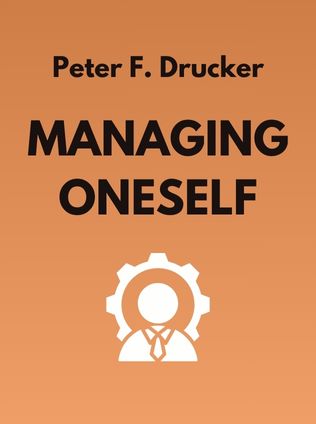
Managing Oneself
By Peter F. Drucker
Published 12/2007
About the Author
Peter Drucker, often referred to as the father of modern management, was a prolific writer, educator, and consultant whose ideas have profoundly influenced the way businesses operate today. Born in Austria in 1909, Drucker moved to the United States in the late 1930s, where he began his long and illustrious career in management theory. He authored numerous books, articles, and essays, with a focus on the practice of management and the ways in which individuals and organizations can achieve excellence. Drucker’s work is characterized by its emphasis on ethical leadership, innovation, and the importance of knowledge workers in the modern economy.
One of Drucker’s most impactful contributions is his concept of self-management, which he outlines in his short but powerful book, Managing Oneself. This book distills his decades of experience into practical advice that empowers individuals to take control of their careers and lives. Drucker believed that the key to success lies in understanding oneself—one’s strengths, weaknesses, values, and where one can make the greatest contribution.
Main Idea
Managing Oneself is a guide to personal and professional success, centered around the idea that self-awareness and self-management are the keys to a fulfilling and productive life. Drucker argues that in today’s knowledge-driven society, individuals must take responsibility for their own development, rather than relying on organizations or traditional career paths. The book encourages readers to reflect deeply on their strengths and weaknesses, to set ambitious but achievable goals, and to continuously seek opportunities for learning and growth.
Drucker’s approach is both practical and philosophical, urging readers to think critically about what they are best at and where they can contribute the most. He emphasizes that by leveraging one’s strengths and managing weaknesses, individuals can achieve a high level of performance and satisfaction in their work. This process of self-management is not a one-time activity but an ongoing practice that evolves as one’s circumstances and aspirations change.
Table of Contents
- Introduction: The Importance of Self-Management
- Understanding Your Strengths
- Identifying Where You Belong
- Planning for the Future
- Building a Strong Network
- Managing Your Second Half of Life
Introduction: The Importance of Self-Management
In the introduction, Drucker sets the stage by explaining why self-management has become so crucial in the modern world. He notes that the days of stable, lifelong careers are long gone, replaced by a dynamic and unpredictable job market. In this environment, the only way to achieve long-term success is by taking control of one’s own career path.
Sign up for FREE and get access to 1,400+ books summaries.
You May Also Like
The Subtle Art of Not Giving a F*ck
A Counterintuitive Approach to Living a Good Life
By Mark MansonRich Dad Poor Dad
What the Rich Teach Their Kids About Money - That the Poor and Middle Class Do Not!
By Robert T. KiyosakiHow To Win Friends and Influence People
The All-Time Classic Manual Of People Skills
By Dale CarnegieQuiet: The Power of Introverts
The Power of Introverts in a World That Can't Stop Talking
By Susan Cain



















